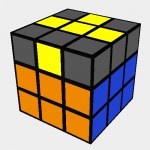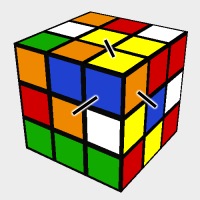Unsolvable Rubik's Cube
When you take apart a Rubik's Cube and put it back together randomly you have only a 1/12 chance that your scrambled configuration is solvable. In case of other Rubik's Cube variations where the orientation of the center piece also counts the chances are even smaller.
If the online Rubik's solver throws the 'Invalid scramble' error first you need to double check your puzzle and make sure you entered the color of each field correctly.
If you keep getting this error then you'll have to disassemble and rebuild your cube in the solved position because it has an unsolvable state.

Examples of impossible scrambles
Not every random scramble can be solved by legal moves because of the parity which refers to whether a permutation is even or odd (can that permutation be represented by an even or odd number of swaps):
- Corner orientation
Each corner piece has three possible orientations. It can be oriented correctly (0), clockwise (1) or counterclockwise (2). The sum of corner orientations always remain divisible by 3, no matter how many legal turns you make. See the first two cases on the image. - Edge orientation
Each legal rotation on the Rubik's Cube always flips an even number of edges so there can't be only one piece oriented wrong. See the third example. - Piece swaps
Considering the permutation of all the corners and edges, the overall parity must be even which means that each legal move always performs the equivalent of an even number of swaps (ignoring orientation). See the last example.

Combining all these laws we get 1/3 * 1/2 * 1/2 = 1/12
Experienced cubers notice that something's wrong when they reach the last layer of the puzzle.
These scrambles can't be solved, you have to take your cube apart to fix it.
Impossible stickering

The image above shows another invalid cube but this case can't be reached by taking apart the puzzle and assembling it incorrectly. This has been stickered wrong and it has never been solvable.
According to the center pieces the white face has to be on the top, but there's an orange-blue-yellow corner that would put the yellow on the top when the orange is on the front and the blue on the right.

We can never have a white-yellow edge piece when the white and yellow center pieces are on the opposite sides of the cube.